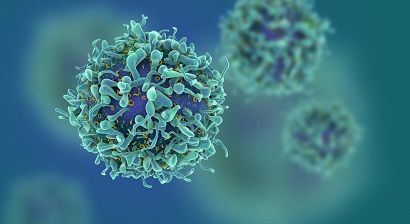Medical News: Ohio State University Discovers That Rebalancing TGFβ1/BMP Signals Reverse T Cell Dysfunctionality During Viral Infections And Cancer.
Medical News - Reversing T-Cell Dysfunctionality Jan 25, 2023 3 years, 1 month, 4 hours, 37 minutes ago
Medical News: Researchers from the Department of Microbial Infection and Immunity, College of Medicine, The Ohio State University, Columbus – USA has discovered a method to reverse T Cell Dysfunctionality that typically occurs during viral infections and cancer by rebalancing the TGFβ1/BMP signals.

This discovery might also prove useful in the current context of SARS-CoV-2 induced immune dysfunction particularly seen in severe COVID-19 and also in many Post-COVID individuals.
Very often, T cell dysfunctionality prevents the clearance of chronic infections and cancer.
Also, epigenetic programming in dysfunctional CD8+ T cells limits their response to immunotherapies, including immune checkpoint blockade (ICB).
However, it is unclear which upstream signals drive acquisition of dysfunctional epigenetic programs, and whether therapeutically targeting these signals can remodel terminally dysfunctional T cells to an ICB-responsive state.
The study team innovate an in vitro model system of stable human T cell dysfunction and show that chronic TGFβ1 signaling in post-effector CD8+ T cells accelerates their terminal dysfunction through stable epigenetic changes.
Conversely, boosting bone morphogenetic protein (BMP) signaling while blocking TGFβ1 preserved effector and memory programs in chronically stimulated human CD8+ T cells, inducing superior responses to tumors and synergizing the ICB responses during chronic viral infection. Thus, rebalancing TGFβ1/BMP signals provides an exciting new approach to unleash dysfunctional CD8+ T cells and enhance T cell immunotherapies.
The study findings were published in the peer reviewed journal: Nature Immunology.
https://www.nature.com/articles/s41590-022-01384-y
This study is the first to find a solution to re-energize critical killer immune cells that have become exhausted when fighting cancer or chronic viral infections.
The immune cells called CD8 T cells are critically important in the immune system's efforts to eliminate cancer cells and viral infected cells from the body. These cells are also key players in immune therapies called immune checkpoint blockade and CAR T-cell therapy.
The study team first developed a new model system to study human CD8 T-cell dysfunction and whether the dysfunction can be reversed.
The new model revealed that chronic signaling by transforming growth factor beta 1 (TGFβ1) accelerates the killer cells' loss of function. It also showed that boosting the activity of a cytokine called bone morphogenetic protein 4 (BMP4) while blocking TGFβ1 could preserve the function of chronically stimulated human CD8 T cells. This also improved responses in animal models to tumors and to a chronic viral infection.
Lead investigator Dr Hazem Ghoneim, assistant professor in the Department of Microbial Infection and Immunity at Ohio State University told Thailand
Medical News, "When killer T cells become severely dysfunctional,
they are unable to effectively clear cancer or viral infections from the body, and they do not respond well to immunotherapies.”
Dr Ghoneim, who is also a member of OSUCCC-James Cancer Biology Research Program further added, "We found that rebalancing TGFβ1 and BMP signaling can unleash these dysfunctional T cells and enhance their response to T cell-based immunotherapies and other immune checkpoint therapies.”
He said, "This new strategy could potentially improve the effectiveness of these therapies and help to clear chronic infections or tumors more effectively.”
The study team reasoned that cues in the tumor microenvironment likely triggered the shift of T cells to a pathway leading to dysfunction. They also reasoned that identifying the key signals involved in that shift would reveal new targets that could improve the effectiveness of T-cell immune therapies.
According to the study team, constant exposure to cancer-cell antigens in the tumor microenvironment or to viral antigens causes killer T cells to show signs of mild burnout and to become mildly dysfunctional.
The study team found that these mildly dysfunctional T cells are driven to a state of profound dysfunction by chronic exposure to TGFβ1 that remain stable even after resting the cells.
The researchers also found that the cytokine BMP4 limits the exhaustion and improves the survival of chronically stimulated CD8 T cells.
The study team then used animal models to show that adjusting the balance of TGFβ1 and BMP signaling could:
-Maintain the tumor-killing ability of human CD8 T cells;
-Boost exhausted T-cell responses to an immune checkpoint blockage therapy; and
-Control a lifelong chronic lymphocytic choriomeningitis viral infection.
Dr Ghoneim commented, "Our study findings indicate that relative levels of TGF beta and bone morphogenetic protein in a tumor microenvironment strongly influence the function of chronically stimulated CD8 T cells, revealing a potential new strategy to epigenetically reprogram dysfunctional T cells during immune checkpoint blockade therapy."
For the latest
Medical News, keep on logging to Thailand Medical News.
